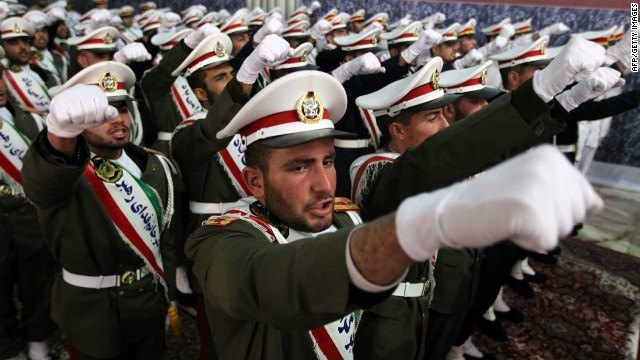“Having been involved in numerous covert action programs, including some involving regime change, I see some major obstacles to a successful regime change policy as it pertains to Iran.”
Recent statements from politicians promoting regime change in Iran show a remarkable lack of understanding regarding the topic and Iran itself. It also demonstrates a simplistic view of covert action, which presumably will be the major tool of a regime change program. It will only lead to more difficulties for the United States in the Middle East.
Having been involved in numerous covert action programs, including some involving regime change, I see some major obstacles to a successful regime change policy as it pertains to Iran.
First and foremost, there is real support for the regime inside Iran. That is not to say that there isn’t discontent, but an extremely large segment of Iranian society supports the current government, though they may not support some of their policies. That is decidedly different from supporting regime change. Opposition to the regime is mainly centered in the urban areas, while support for the government is more extensive in conservative rural areas.
We should not project our own beliefs on the Iranian people. Because we find a theocratic government abhorrent, we should not assume that the Iranian people believe the same thing. We should not equate discontent with certain policies of the Iranian government with a desire to change that government. There is currently not sufficient support within Iran for regime change, although that may change as time progresses.
Iran’s most serious opposition comes from the youth, which is not the basis for a larger, successful regime change program. Getting support from the segments of society that are critical to regime change, such as the military, security apparatus, middle class, and those with access to power, would be difficult under current circumstances.
Secondly, the 1953 CIA sponsored Iranian coup is still relatively fresh in the minds of the Iranian people. This is one of the principal reasons why so many Iranians view the U.S. with such animosity. We overthrew a legitimately elected government and installed a repressive monarchy that we supported for decades. The Iranian revolution was a reaction to that coup. It is not likely that we would find much support for another CIA directed coup outside delusional Iranian monarchist circles. Nor would the Iranian people trust us to choose another government for them given our history with the Shah. A regime change policy may actually give more legitimacy to the current regime.
Thirdly, even if we could find support for regime change inside Iran, we would need a replacement government to demonstrate to the Iranian people what we, and they, were supporting. It would have to be legitimate, not ineffectual and corrupt, nor repressive. It must represent the legitimate aspirations of the Iranian people. Hence, we could not support the exiled Iranian monarchist groups that wish to restore the shah to the throne.
The replacement government must have a significant following and support base within Iran, it cannot be created from whole cloth or be seen as a foreign puppet, something near impossible if it is a direct result of a U.S. initiated regime change program. It should not come from outside exile groups who would be viewed as outsiders that do not represent the Iranian people, nor have their best interests in mind. No such group exists inside or outside Iran today.
There has been mention of using separatist groups as part of regime change. This demonstrates a total lack of understanding of regime change. These groups have no interest in changing the regime in Iran; instead, they want to split off from Iran and establish their own independent nation states. Supporting such groups would alienate the Iranian people as a whole , and bolster support for the Iranian government as they work to keep the nation intact. At best, this would lead to a Syria like situation where civil war and chaos reign supreme.
In addition, there is the difficulty of mounting covert action inside a repressive police state. Iran has an extremely competent security apparatus that is designed, in part, to identify and neutralize just such threats. Mounting covert operations inside such a system, and that is what would be required for regime change to be effective and successful, would pose very difficult odds to work with. We could expect serious compromises in a regime change covert action program, with attendant loss of life and capabilities, not to mention embarrassment to the U.S.
Using non covert means such as economics and diplomacy haven’t worked in the past, you only have to look as far as Cuba to realize that. Over 50 years of embargo and attempts at diplomatic isolation have left the Cuban regime in power as securely as ever. The Cuban regime has been able to blame shortages on the embargo, rather than their failed communist economic policies, and blames repression on the need to counter anti-revolutionary efforts by the arch enemy, the U.S. Let’s not institute another failed policy.
Finally, there is the law of unintended consequences. When we executed regime change in Iraq, we did not expect the mess that resulted from our successful removal of the Saddam Hussein regime. Before even considering regime change, we need to have a concrete and detailed idea of our desired outcome. We’ll also need to make a decision on what would replace the current Iranian regime. It must be legitimate and have the support of the Iranian people.
We, as a nation, need to steer what comes afterwards, guiding the new government through its creation and early tenure, something we have a decided tendency to do poorly. We have to own the change and not walk away — and there lies the conundrum. The more we guide the new regime, the more of a U.S. puppet it appears to be. Chaos will result.
Regime change should come naturally and internally. We can support that, not create it.

















